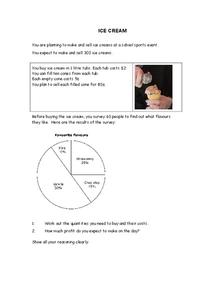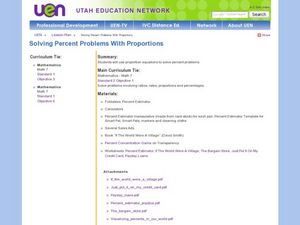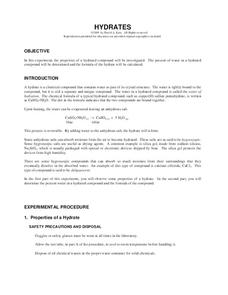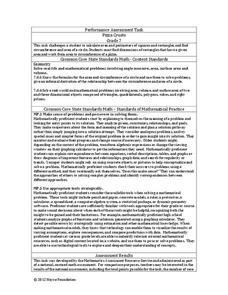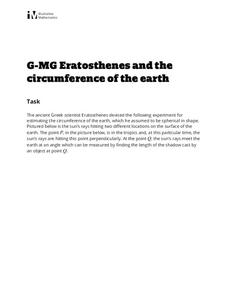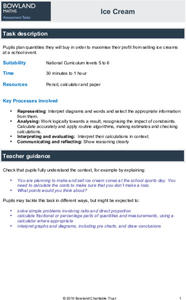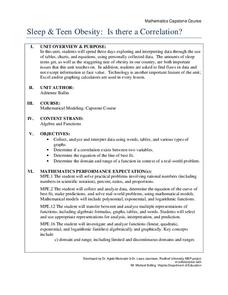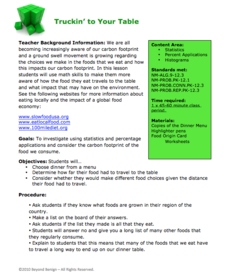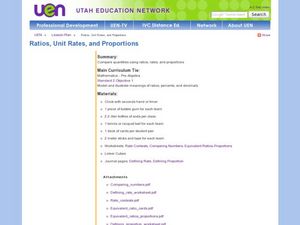Mathematics Assessment Project
Ice Cream
I scream, you scream, we all determine the amount of ice cream! Pupils calculate the amount of ice cream flavors needed based on survey results in a short summative assessment. They determine the number of tubs and cost of ice...
Curated OER
Solving Percent Problems with Proportions
Seventh graders explore the concept of percent problems. In this percent problem activity, 7th graders use proportion equations to solve percent problems. Students find percentages of numbers and use proportions to determine percents...
Curated OER
Go Figure! Using Percents in the Real World
Sixth graders solve sales tax problems. In this solving sales tax problems lesson, 6th graders find the sales tax on various items. Students are given a list of expenses that a family spent on vacation before taxes. ...
Curated OER
Number and Number Relations: Lesson 2
Eighth graders recognize or compute decimal equivalents of fractions. They recognize or compute the percent equivalent of decimal fractions. They relate fraction, decimal, and percent equivalents and recognize decimal equivalents.
Curated OER
Ratios, Fractions, Percents And Decimals
Sixth graders, while in the computer lab, participate in the game, Practicing Ratios, where they must calculate one missing term of a ratio. They complete all the puzzles, view their scores and then complete a paper copy of the follow-up...
EngageNY
Solving Area Problems Using Scale Drawings
Calculate the areas of scale drawings until a more efficient method emerges. Pupils find the relationship between the scale factor of a scale drawing and the scale of the areas. They determine the scale of the areas is the square of the...
Chymist
Hydrates
What occurs when a hydrate is heated? Lead your class in exploring the answer to this question as they investigate the properties of a hydrated compound. They heat copper(II) sulfate pentahydrate and evaporate the water...
Math Worksheets Land
Markups and Markdowns Word Problems - Guided Lesson
Show your shoppers that knowing how to calculate the percent increase or decrease of an item is a handy tool to know when they are looking for a good sale. Use as a quick three example introduction to the topic. The guided practice...
It's About Time
What Determines and Limits an Atom's Mass?
Provide learners with the tools to further understand nuclear energy and isotopes. Young chemists investigate the components of an atom's nucleus, use symbols to represent various isotope forms, and use the percent abundance of an...
Noyce Foundation
Pizza Crusts
Enough stuffed crust to go around. Pupils calculate the area and perimeter of a variety of pizza shapes, including rectangular and circular. Individuals design rectangular pizzas with a given area to maximize the amount of crust and do...
Virginia Department of Education
z-Scores
Just how far away from the mean is the data point? Pupils calculate the standard deviation for a set of data and find out how many standard deviations a point is away from the mean. The teacher leads a discussion on how to calculate...
Inside Mathematics
Marble Game
Pupils determine the theoretical probability of winning a game of marbles. Individuals compare the theoretical probability to experimental probability for the same game. They continue on to compare two different probability games.
Achieve
False Positives
The test may say you have cancer, but sometimes the test is wrong. The provided task asks learners to analyze cancer statistics for a fictitious town. Given the rate of false positives, they interpret the meaning of this value in the...
Illustrative Mathematics
Eratosthenes and the Circumference of the Earth
The class gets to practice being a mathematician in ancient Greece, performing geometric application problems in the way of Eratosthenes. After following the steps of the great mathematicians, they then compare the (surprisingly...
Inside Mathematics
Rhombuses
Just what does it take to show two rhombuses are similar? The assessment task asks pupils to develop an argument to show that given quadrilaterals are rhombuses. Class members also use their knowledge of similar triangles to show two...
Bowland
Ice Cream
Make sure there is enough ice cream on hand. Learners try to find out how much ice cream to buy for a sports event. Scholars use a pie chart showing the percent of a sample of people who like different flavors of ice cream. Using the...
Inside Mathematics
Expressions
Strive to think outside of the quadrilateral parallelogram. Worksheet includes two problems applying prior knowledge of area and perimeter to parallelograms and trapezoids. The focus is on finding and utilizing the proper formula and...
Radford University
Sleep and Teen Obesity: Is there a Correlation?
Does the number of calories you eat affect the total time you sleep? Young mathematicians tackle this question by collecting their own data and making comparisons between others in the class through building scatter plots and regression...
National Research Center for Career and Technical Education
Transportation, Distribution, and Logistics: Tire and Wheel Assemblies
Is bigger really better? By the end of this lesson plan, learners will be able to apply formulas for computing the diameter of tires and wheel assemblies. Begin by showing a slide presentation that will review definitions for radius and...
Science Geek
The Hydrogen Bomb
Recycled Russian nuclear weapons provide 10 percent of the nuclear energy that the United States uses. The short presentation discusses the Teller-Ulam device. It provides a diagram of the parts as well as a description of the four...
Beyond Benign
Truckin’ to Your Table
Food takes a trip to the table. Class members choose a meal from a menu and calculate the total cost of the meal including tax and tip. Using a food origin card, pupils determine how far each of the ingredients of a meal traveled to end...
Curated OER
Soil Excavation
Students comprehend how percent of change and multipliers are used to determine volume for removal and replacement of soils. They calculate soil volume percent changes using data tables. They apply formulas to solve a variety of...
Curated OER
Ratios, Unit Rates, and Proportions
Explore the concept of ratios, unit rates, and proportions. Learners convert fractions and percents to decimals. They discuss rates and where they can be found in the real world. A hands-on experiment and numerous flash cards and...
Curated OER
The Meaning Of Percent
This lesson provides students with a variety of exercises which allow them to increase their ability to understand percentage.


